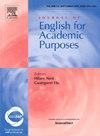Utilization of appraisal resources for acknowledging limitations within doctoral theses across disciplines
IF 3.4
1区 文学
Q1 EDUCATION & EDUCATIONAL RESEARCH
引用次数: 0
Abstract
In doctoral thesis composition, the acknowledgment of limitations not only showcases writers' capacity for self-evaluation but may operate to sway disciplinary examiners to perceive caveats in a more positive light, hereby constituting a crucial element in determining the acceptability and justification of research within disciplinary communities. Nonetheless, scant consideration has been given to the disciplinary interpersonal strategies for acknowledging limitations within the ESAP literature. To remedy the oversight, this study investigated the mediation of interpersonal discursive practices through the appraisal system (Martin & White, 2005) alongside any disciplinary variation in the limitations of 120 doctoral theses across hard and soft disciplines. Results showed prevalent utilization of diverse appraisal features, serving to convey authorial viewpoints, negotiate potential alternative perspectives, and fortify compromises with expert examiners. Cross-disciplinary analyses further revealed soft-disciplinary writers’ notable preference for most appraisal resources, suggesting variations in disciplinary knowledge structure and conventional practice. The findings are anticipated to inform interpersonal strategies for delivering limitations, develop the current comprehension of disciplinary modes of knowing and social practice, and offer pedagogical insights for thesis writing instruction.
利用评估资源来承认跨学科博士论文的局限性
在博士论文写作中,对局限性的承认不仅展示了作者自我评估的能力,而且可能会影响学科审查员以更积极的眼光看待这些警告,从而构成决定学科社区内研究的可接受性和正当性的关键因素。尽管如此,在ESAP文献中,承认局限性的学科人际策略很少得到考虑。为了弥补这一疏忽,本研究通过评估系统调查了人际话语实践的中介作用(Martin &;White, 2005),以及在120篇软硬学科博士论文的限制下的任何学科差异。结果显示,普遍使用不同的评估特征,服务于传达作者的观点,协商潜在的替代观点,并加强与专家审查员的妥协。跨学科分析进一步揭示了软学科作者对大多数评价资源的显著偏好,这表明学科知识结构和传统实践存在差异。研究结果有望为人际交往策略提供信息,以克服局限性,发展当前对学科认知模式和社会实践的理解,并为论文写作指导提供教学见解。
本文章由计算机程序翻译,如有差异,请以英文原文为准。
求助全文
约1分钟内获得全文
求助全文
来源期刊

Journal of English for Academic Purposes
Multiple-
CiteScore
6.60
自引率
13.30%
发文量
81
审稿时长
57 days
期刊介绍:
The Journal of English for Academic Purposes provides a forum for the dissemination of information and views which enables practitioners of and researchers in EAP to keep current with developments in their field and to contribute to its continued updating. JEAP publishes articles, book reviews, conference reports, and academic exchanges in the linguistic, sociolinguistic and psycholinguistic description of English as it occurs in the contexts of academic study and scholarly exchange itself.
 求助内容:
求助内容: 应助结果提醒方式:
应助结果提醒方式:


